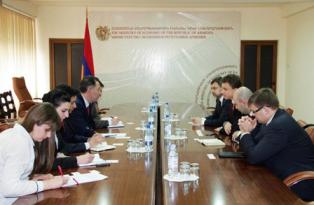Mission of Project Experts of EurAsEC Anti-Crisis Fund in Armenia

Moscow, 2 March 2014. A mission of the project team of the Eurasian Development Bank — Resources Manager of the EurAsEC Anti-Crisis Fund (ACF) — took place in the Republic of Armenia in the period 24 to 27 February. During the mission, the project team experts of the ACF met with Vache Gabrielyan, Vice-Prime Minister, Gagik Khachatryan, Minister of Finance, Karen Chshmarityan, Minister of Economic Development, Sergo Karapetyan, Minister of Agriculture, and Joseph Isayan, Deputy Minister of Energy and Natural Resources, to outline vectors of further cooperation and identify potential projects in transport, energy and agricultural sectors, considered for financing by the Fund.
Also in the course of the mission the experts managed to successfully finalize negotiations on the loan agreement for the project “Construction of North-South Road Corridor” (Phase 4)", and the parties came to an arrangement on initiating the signing process. The Resources Manager will shortly table a draft agreement for consideration by the ACF Council.
Concurrently, the experts started consultations with the Armenian authorities on matters related to the proposed allocation of an ACF financial credit. During the visit, the EDB experts had meetings with managers and technical experts of the Ministry of Finance, the National Bank of the Republic of Armenia, other ministries and departments, as well as international financial institutions. The experts discussed with their counterparts the current economic condition of the country in the context of the current economic decline and sweeping devaluation of the rouble in Russia.
According to the available preliminary data, the GDP growth in Armenia at the end of 2014 slightly slowed down to 3.4% as compared to 3.5% in 2013. The above reduction of the GDP growth was largely due to the decline in cash remittances from Russia and the decreased demand and prices for traditional Armenian exports, including non-ferrous metals. The persistent economic slump in Russia may further exacerbate the economic condition of Armenia and bring about a deficit of the balance of payments. To minimize negative impacts of external shocks, it appears essential to consolidate the budget and to pursue more flexible exchange rate policies, as well as to accelerate implementation of the structural reforms already outlined by the Armenian Government, to enable sustained economic growth for the medium and long term.
The EDB experts intend to proceed with their consultations with the authorities of Armenia with a view to setting up a program of action of the Armenian Government and a facility for funding by the ACF.
Additional Information
Eurasian Development Bank is an international financial institution founded by Russia and Kazakhstan in January 2006 with the mission to facilitate the development of market economies, sustainable economic growth and the expansion of mutual trade and other economic ties in its member states. The member states of the Bank are the Republic of Armenia, the Republic of Belarus, the Republic of Kazakhstan, the Kyrgyz Republic, the Russian Federation, and the Republic of Tajikistan. Read more at https:// /.
The EurAsEC Anti-Crisis Fund (ACF) amounting to US$8.513 billion was formed on 9 June 2009 by the governments of six countries: Armenia, Belarus, Kazakhstan, Kyrgyzstan, Russia, and Tajikistan. The objectives of the ACF are to assist the member countries in overcoming the consequences of global financial crisis, ensure their economic and financial stability, and foster integration processes in the region. The ACF member countries signed the Fund Management Agreement with Eurasian Development Bank giving it the role of the ACF Resources Manager. Read more at https://efsd.org/.
Источник: